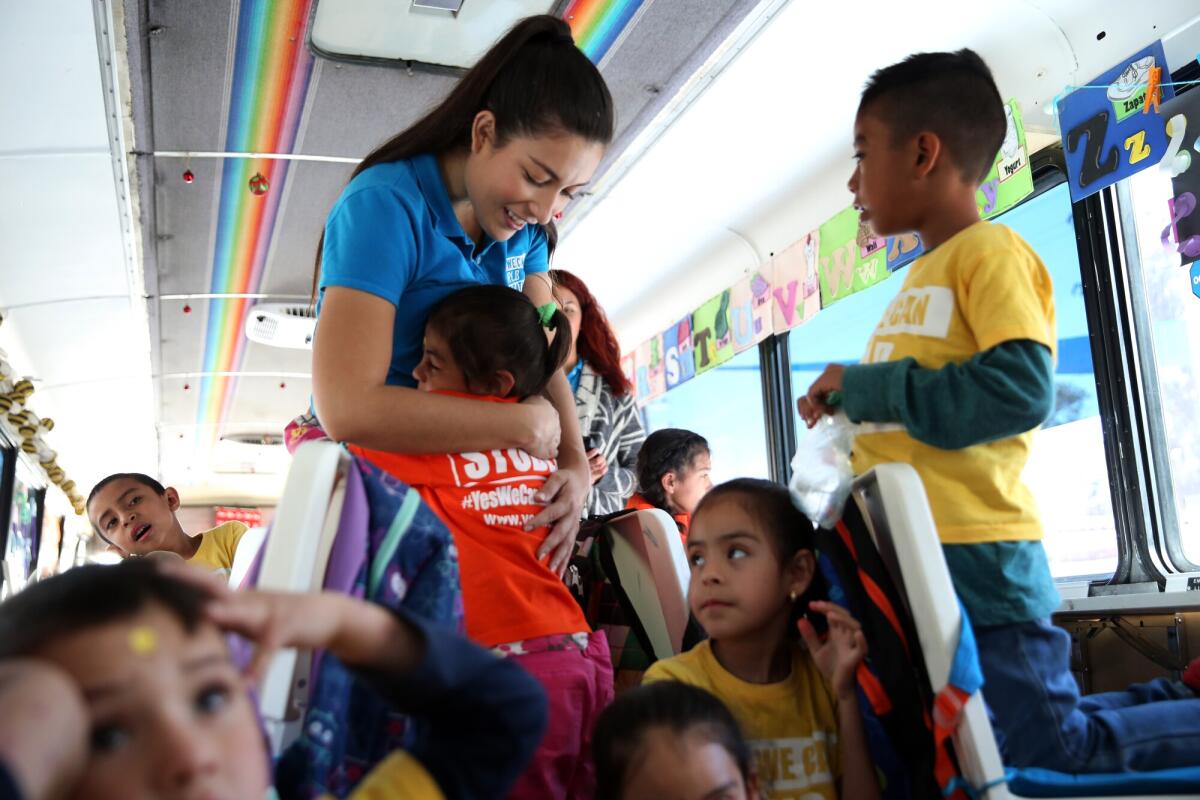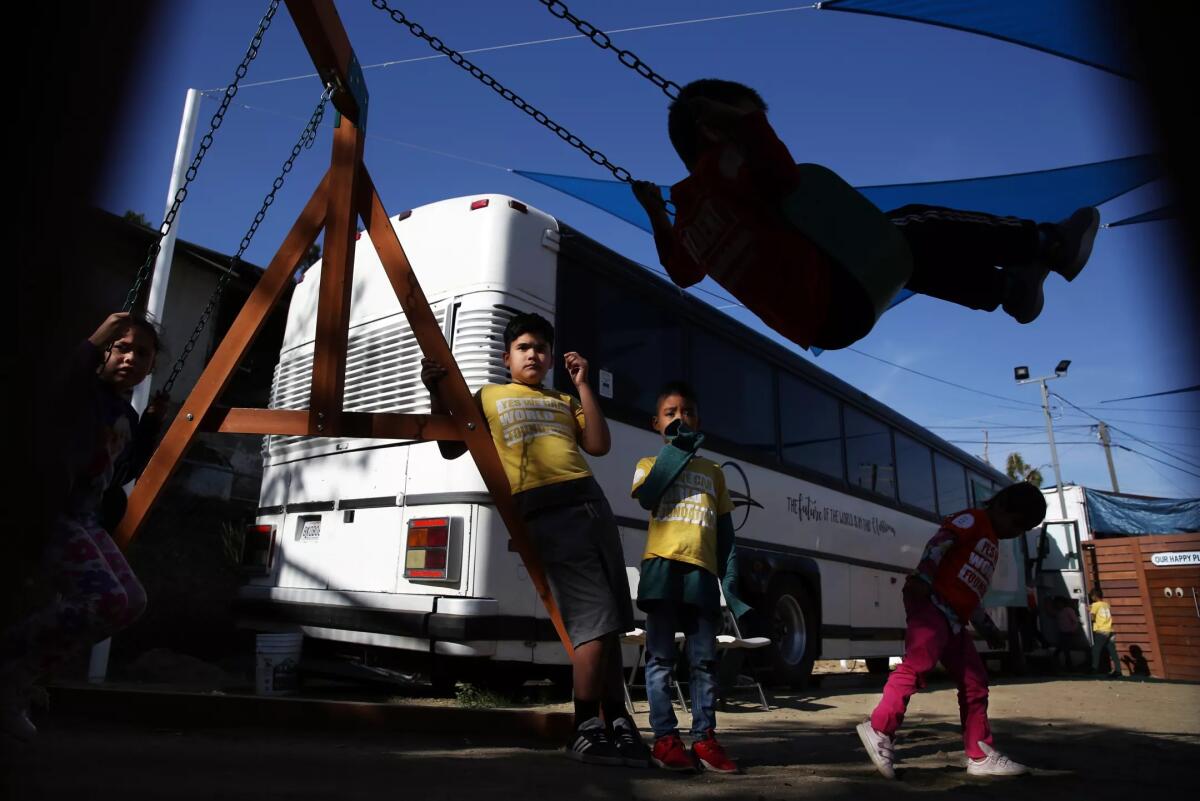Far from Hollywood’s glamour, Estefanía Rebellón celebrates four years helping migrant children

- Share via
When she starred as one of two sisters crossing the border through the Sonoran desert in the film “On the Other Side,” actress Estefanía Rebellón had her first experience of what thousands of people in search of the American dream face.
But cinema is one thing, and reality another thing entirely.
When she was 10 years old and living in Cali, Colombia, her parents came to her school one day to pick her up earlier than usual. They told her they were going to leave the country because they were under death threats from the Revolutionary Armed Forces of Colombia (FARC), the left-wing guerrilla group that for decades waged a civil war against the government that left hundreds of thousands dead over more than a half-century.
“The only thing I was able to take was a toy,” recalls Rebellón. “I arrived in Miami with what I was wearing.”
Seeking to fulfill her dream of being an actress, Rebellón left Florida and moved to Los Angeles, where she began a promising career in the world of film and television. By 2017, she had written, directed, and acted in several films and series, such as “Grachi” (2011), “Husband for Rent” (2013) and “Jane the Virgin.”
But in 2018, when the migratory flow reached a crisis point, and dozens of migrant caravans from Central America arrived at the U.S.-Mexico border, her glamorous life in Hollywood turned upside down. Something told her that she had to go to Tijuana and see what was happening up close.

And she didn’t think twice. In Los Angeles, together with her partner, Kyle Thomas Schmidt, an actor, director and stuntman, she formed the organization Yes We Can, and in less than three months they had purchased a school bus and converted it into a school that was placed on the grounds of the Pro Amore Dei hostel in Tijuana.
The question is unavoidable: Why a school?
“When I arrived from Colombia, everything changed from one day to the next and the only place where I felt safe was at school,” she tells me with a touch of nostalgia for those difficult days of her childhood. “That’s why a school in Tijuana was a way to make life a little easier for these children who have had to go through so many difficulties.”
When I visited the Yes We Can school in Tijuana, I met teacher Clarisa Carrasco, who, amid the noise of the classroom, played soft music, as if for meditation, and asked the children to “breathe in, and out,” as she slowly raised and lowered her arms.
The effect was immediate. The uproar gradually turned into a silence that was only broken by the delicate music. “Now drop all thoughts, just focus on your breathing.…”
Amid all the stress the children experience, school offers them a bit of stability, Carrasco, who has extensive experience working with migrant children from Latin America, told me.
Here at this school, everyone, children and adults, has a story to tell.
Like the 5-year-old Guatemalan girl who hugs a huge teddy bear while describing, in minute detail, her experience of staying in the immigration detention center, known as the “ice box”; the cold she feels when she sleeps with an aluminum blanket, and the little pain she felt in her chest when immigration authorities separated her from her mother.
Or Isabel, a Guatemalan girl with beautiful light-brown eyes who left her town when armed men attacked her neighbors’ houses.

The bus is part of the Yes We Can Mobile Schools project of the Yes We Can World Foundation, a nonprofit formed to support migrant children trapped on Mexico’s northern border while they wait for U.S. authorities to accept or deny their asylum applications.
The dynamic within the school is similar to that of other educational systems. There are two instructors who teach different subjects bilingually. The children start activities at 9 in the morning and at 11 they take a break for breakfast. The day ends at 1 in the afternoon.
In 2021, the Yes We Can Mobile Schools program turned 2 years old. “We were very surprised to see that, despite the global confinement due to the pandemic, thousands and thousands of families continued to migrate, making schools increasingly necessary,” says Rebellón.
Between 2020 and 2021 Yes We Can opened two new schools with the same model in the states of Baja California and Chihuahua. The impact has been so great that the Ministry of Public Education of Mexico granted official recognition to its study plans, thus making it the first bilingual academic program for migrant children.
Impressive achievements
In July, Yes We Can will turn 4 years old and will be starting the construction of a new bus in Los Angeles that will be used as a school in one of the border cities. “We always need volunteers to help us, the work is never done,” Rebellón says with a laugh.
What this young actress has accomplished through organizing Yes We Can in four years is impressive. Here are some data:
She has provided education and enrolled more than 2,800 immigrant and refugee children in her Mobile School Program.
She has provided more than 2 million hours of education to children in crisis.
She has built four school spaces on the border between the United States and Mexico, two in Tijuana, one in Mexicali, and one in Ciudad Juárez. The organization currently operates three school spaces, two in Tijuana and one in Ciudad Juárez.
It has developed its own curriculum for working with refugee and immigrant children and has developed specialized courses for children in crisis and migrants.
The schools serve more than 300 students daily between the ages of 3 and 15, and offer education for pre-kindergarten, kindergarten, primary grades from first to fifth grade and sixth to eighth grade.
The schools work with children of 10 different nationalities including those from Mexico, Honduras, El Salvador, Guatemala, Nicaragua, Venezuela, Colombia, Haiti, Brazil, and U.S.-born children whose parents have been deported.
Yes We Can has handed out more than 2,800 new backpacks with school kits and has provided more than 2,800 uniforms to children enrolled in its programs.

All that work has given Rebellón great satisfaction. In 2023 she was named Woman of the Year by the Women’s March LA Foundation. In 2021 she was nominated for the Alfonso García Robles Humanitarian Award by the National Autonomous University of Mexico (UNAM) for the defense, promotion, protection and guarantee of the human rights of immigrants who are in a condition of vulnerability.
A pleasant surprise
In June 2022, Rebellón received a direct message from Alejandro Mayorkas, director of the Department of Homeland Security, and her heart jumped in her chest. It’s not every day you get calls like this.
The message was simple: The United States government wanted to inform her that she had been named an “Outstanding American” for her work leading the Yes We Can organization.
How does it feel to get recognition like that? Rebellón remains very serious as she tells me, “This is a recognition to my family, to the migrants, and to all of us who have come to this country and have contributed to making it bigger and more prosperous.”
And although in recent years she has been focused on how the lifting of Title 42 is affecting global immigration, she has not put aside her dream of being an actress.
“But I’m not going to lose myself in the glamour and elegance of Hollywood,” she tells me with conviction. “I have a conscience and I am consistent with what I believe, so I will continue fighting for each of my dreams, no matter how difficult they may seem.”
More to Read
Sign up for Essential California
The most important California stories and recommendations in your inbox every morning.
You may occasionally receive promotional content from the Los Angeles Times.











